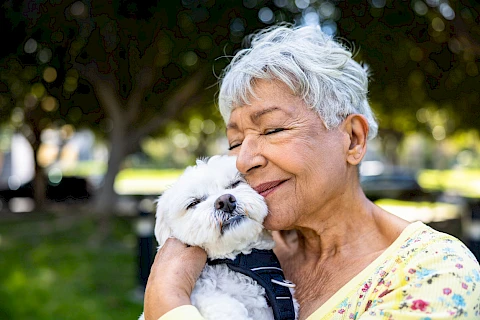
In the golden years of life, compassionate companionship can play a vital role in maintaining emotional well-being, cognitive health, and overall quality of life. While human interaction is invaluable, the therapeutic potential of animal companionship is emerging as a powerful tool in senior care. This form of healing and comfort, known as pet therapy, offers a wide range of benefits for seniors, from easing loneliness to reducing stress and stimulating physical activity.
As a caregiver, understanding pet therapy and how to incorporate it into your routine can significantly enhance the life of the senior in your care. In this guide, we will delve into the heartwarming world of pet therapy, explore its numerous benefits, and provide practical tips for effectively incorporating this unique form of therapy into the daily lives of our beloved seniors.
What is Pet Therapy?
At its core, pet therapy revolves around interactions between a senior and a trained animal, usually in the presence of a handler. The treatment may involve simply spending time with the animal, petting it, or engaging in fun activities. While dogs are the most common therapy animals, a range of creatures, including cats, rabbits, and birds, can also serve this purpose.
The magic of pet therapy lies in the strong bond that can develop between humans and animals. When seniors interact with animals, their bodies produce a relaxation hormone, which can significantly reduce stress levels. Physically, pet therapy can stimulate activity, whether it's through stroking a pet, taking it for a walk, or engaging in play.
Beyond the physical benefits, pet therapy can make a world of difference to seniors' mental health. It can help ease loneliness or anxiety, promote a positive mindset, and enhance cognitive function by stimulating conversation and memory recall.
Incorporating Pet Therapy into Senior Care
If you're considering pet therapy for the senior you care for, you can incorporate it into your care routine in several ways.
Therapy Animals
Several organizations offer this service, with trained therapy animals and handlers visiting homes to spend time with seniors. Preparing the senior for the visit is essential, as is explaining what to expect and assuring them that therapy animals are gentle and friendly.
Owning a Pet
The responsibility of pet care can provide a strong sense of purpose and routine, which are critical for mental health. The choice of pet should align with the senior's abilities and preferences. A small, gentle dog or a low-maintenance cat might suit many seniors. As a caregiver, you must be prepared to help with pet care tasks, whether feeding, grooming, or taking the pet to vet appointments.
Preparing the Home
Whether you choose regular pet visits or take a pet into the home, create a pet-friendly environment. This goes beyond ensuring the environment is safe for the pet—it should also be comfortable for the senior and the animal. Minor adjustments, such as having a cozy place for the pet to sleep and ensuring pathways are clear for both the pet and senior, can make a difference.
Want to Incorporate Pet Therapy Into Your Care Routine?
Pet therapy can offer many physical and mental health benefits for seniors. While it may require extra work and adjustment, the rewards for you and the senior will undoubtedly outweigh the effort.
Our team at Senior Helpers Chandler-Gilbert offers guidance for any aspect of senior care. Serving Chandler, Gilbert, Tempe, Ocotillo, Santan, and surrounding areas, we are committed to providing the best care for your loved ones. Feel free to contact us for any assistance.